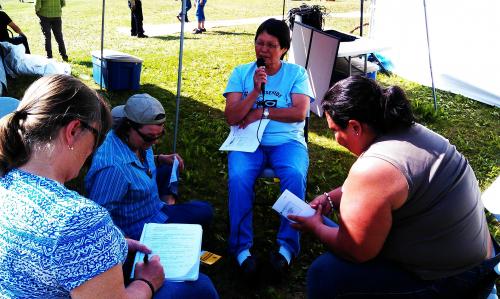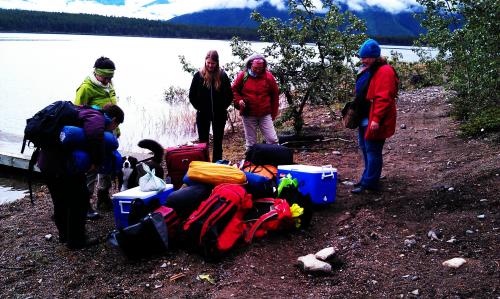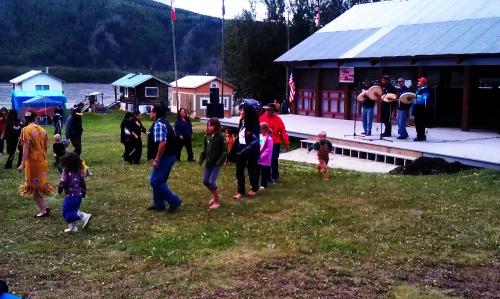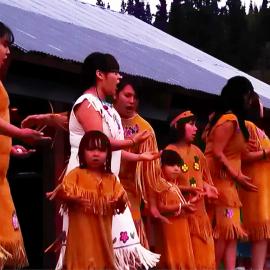By the YFN Case Study Team
This summer, in collaboration with our community partners Champagne & Aishihik First Nations (CAFN), the Carcross-Tagish First Nation (CTFN) and the Ta’an Kwach’än Council (TKC), IPinCH team members Catherine Bell and Sheila Greer travelled across the Yukon conducting focus groups and participating in formal and informal discussions with Yukon First Nations (YFN) youth, elders, community members and heritage staff, seeking insight into what the concept of ‘heritage’ means to YFN communities and how heritage resources can be managed in such a way as to reflect and respect their values.

Image at top left: Performers from a Yukon First Nations dance group on stage at Moosehide Gathering, the biannual cultural celebration hosted by the T’rondëk Hwëch’in First Nation at Moosehide Village near Dawson City, Yukon. Image Left: Current T’rondëk Hwëch’in First Nation Director of Heritage Jackie Olson (right) listens as former THFN Chief Angie Joseph-Rear (holding microphone), talks about Heritage values with IPinCH project note-takers Joanne Lauder (far left) and Sheila Greer. (All photos: Jo Anne Lauder and Cathy Bell).
JoAnne Lauder, a long-time friend of Catherine, came along to record the meetings. Throughout the journey the team was met with incredible hospitality, generosity of spirit and support by YFN citizens. Research partners Heather Jones (CTFN), Paula Banks (CAFN), Betsy Jackson (TKC), and Jodie Beamont (Tr’ondek Hwech’in, THFN) worked tremendously hard to ensure all needs were met and also attended various sessions.
Following the settlement of their respective land claim and self-government agreements, Yukon First Nations own and have responsibility for managing Heritage Resources on their Settlement Lands, while Canadian governments (Yukon and Canada) have responsibility for managing Heritage Resources on other lands in the Yukon Territory. Wherever located, heritage resources related to the culture and history of Yukon Indian peoples are to be managed consistent with Yukon First Nations values and culture. An important step towards realizing this objective is determining what YFN heritage values are and how they may differ from western heritage values—the primary goal of the ethnographic component of this IPinCH-funded study.

Logistics are a regular part of research in the Yukon, as members of the Yukon IPinCH team arrive at Dora’s Fish Camp, on Millhaven Bay (Bennett Lake) in Carcross-Tagish First Nation traditional territory. (All photos: Jo Anne Lauder / Cathy Bell).
During travels that took them from cultural centres to fishing camps, and from Whitehorse to Moosehide (a traditional annual gathering place near Dawson city), the team listened and learned about how ‘heritage’ and ‘heritage value’ are understood, about who has relationships of belonging and responsibility, and about other topics central to developing heritage research management policy, practice and law around YFN ethnographic and archaeological heritage.
Joining them for the CAFN General Meeting and youth interviews was Jessica Lai, a doctoral student who just completed her dissertation in intellectual property law and continues to collaborate with Catherine on research relating to protection of Indigenous intangible heritage in museums. Nicole Aylwin, IPinCH research fellow, joined the final days of the research trip and attended a two-day retreat with an artist, council member, and elders of the CTFN at Millhaven Bay, where we shared stories, cooked and worked together, and took time to nourish our spirits by participating in a sweat lodge ceremony. The journey ended with an insightful discussion with YFN Elders, including exploration of possible processes to move forward with more extensive discussions with CTFN members, at Skookie’s Camp, a traditional hunting camp now used as a central gathering place of teaching and learning.

The Ross River Drummers (Kaska) get the audience moving at the 2012 Moosehide Gathering, the biannual cultural celebration hosted by the T’rondëk Hwëch’in First Nation at Moosehide Village near Dawson City, Yukon. (All photos: Jo Anne Lauder / Cathy Bell).
The interview recordings are now being transcribed and the data thematically organized. YFN community partners will be provided with verbatim transcripts and thematically organized transcripts. Once this process is complete, Nicole and Catherine will develop a thematic summary from all sessions that will be circulated to our YFN partners for input and approval. This information will inform other projects that Catherine, Nicole and legal research assistants will complete, including development of a workshop for YFN partners on developing policy and legislation and academic research that will (1) compare YFN and mainstream Canadian legal and government understandings of heritage, rights, responsibilities, and management, and (2) compare national and international community driven and developed cultural policies with international cultural rights norms and other cultural policy conventions.
Some important themes emerging from the work so far include:
• ‘Things’ in and of themselves are not heritage; rather, it is the relationships, experiences and the stories embodied within these ‘things’ that constitute them as heritage. Also, heritage (both tangible and intangible) does not have to be ‘old’ to be ‘significant’;
• Heritage is a ‘verb’ or a ‘moving word’ that references the process of maintaining intergenerational continuity or a ‘bringing of the past into the future.’ It involves respecting the old, which is achieved through cultivating a connection to ancestors and being guided by the voice of the elders (including through elders’ councils), but also involves the opportunity and responsibility of passing on tradition to the next generation;
• The concept of heritage is tied closely to the values of integrity and responsibility. Unlike westernized heritage logics that operate using a proprietary framework that emphasizes ownership and possessiveness, for YFNs in many instances it is more appropriate to speak of heritage in terms of stewardship and a duty of care;
• Education has a central role in managing heritage resources; it is only when people recognize these relationships that they can honor them. Teaching traditional knowledge and skills to the community’s youth is integral to the maintenance of heritage resources since they inspire young people and strengthen their bond to the community while also providing them with valuable skills; and
• There are clearly defined clan and family responsibilities in relation to certain forms of heritage. Engagement with citizens, families and clans should be central to YFN heritage management practice.
We look forward to learning more from this project as we move towards its final stages.






